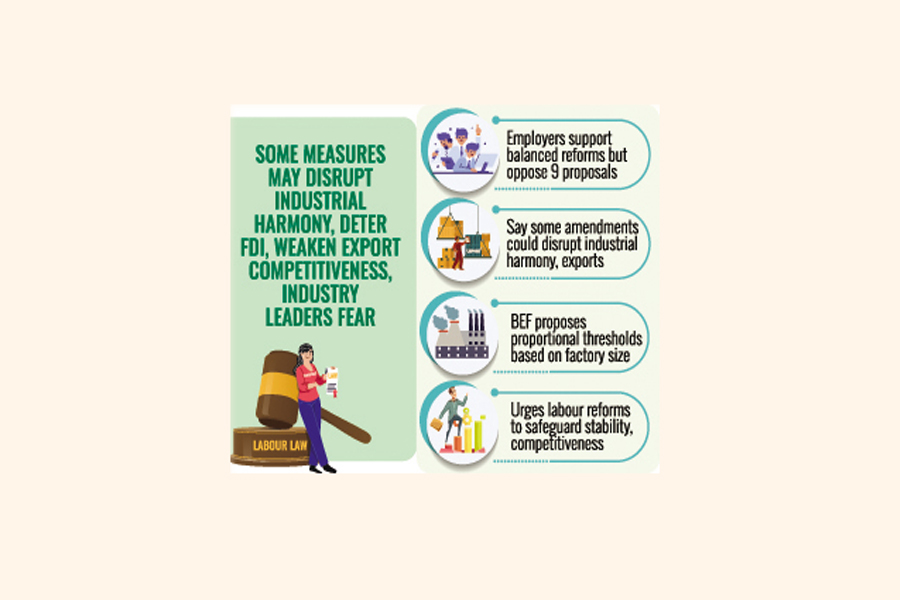
Published :
Updated :

Industry leaders in Bangladesh voiced concerns over several proposed amendments to the Bangladesh Labour Act as they think some measures could disrupt industrial harmony, deter foreign investment and weaken the country's export competitiveness.
At a discussion organised by the Bangladesh Employers' Federation (BEF) in Dhaka on Saturday, employers expressed support for balanced reforms but opposed at least nine of the 101 proposed changes, calling for broader stakeholder consultation before implementation.
President of the BEF Fazlee Shamim Ehsan highlighted one of the most contentious proposals which would allow a trade union to be formed with just 20 workers regardless of the factory size.
The event was attended by business leaders from multiple sectors along with BEF members.
"This could lead to a proliferation of paper-based unions in small and medium factories, triggering frequent disputes and lowering productivity," said Mr Ehsan, who also serves as executive president of the Bangladesh Knitwear Manufacturers and Exporters Association (BKMEA).
He also alerts that simplifying the union-registration process could send negative signals to foreign investors, thus jeopardising job creation and long-term economic growth.
Under the current law, forming a trade union requires the support of 20 per cent of a factory's workforce. The BEF proposed a proportional system, with thresholds based on factory size, such as 3,000, 5,000, or 10,000 workers.
Another amendment drawing criticism relates to the mandatory establishment of provident funds for factories employing 100 workers or more.
"Workers have not shown interest in such schemes as both employers and employees must contribute. Making it compulsory will only add to compliance burdens," Mr Ehsan said.
President of BKMEA Mohammad Hatem echoed the concerns, noting that in countries like Vietnam, a single state-supervised union protects workers' rights effectively.
"If unions can be formed with only 20 workers, foreign investors will think twice before entering the market," he said.
He questions whether the move is aimed at meeting European Union or International Labour Organisation (ILO) requirements without considering Bangladesh's unique economic realities.
Md Farooq Ahmed, BEF secretary-general, makes it clear that employers are not against labour reforms but urges a balanced approach.
"Workers' rights must be ensured, but reforms should also safeguard business stability and competitiveness," he told the meet. He recommends strengthening the Department of Inspection for Factories and Establishments, simplifying registration processes, and building institutional capacity before enacting sweeping changes.
"ILO's recommendations are global in nature, not country-specific. Bangladesh must adapt them in line with its own socioeconomic context," says Mr Ahmed.
The federation leaders stressed that workers' right to organise must be preserved but, at the same time, maintaining a stable production environment and industrial harmony is equally important. They plan to present to the government soon an alternative proposal regarding the requisite ratio of workers for union registration.
The reformist post-uprising government is currently amending the labour law to make trade-union activities easier inside factories, in line with commitments made to various development partners and international stakeholders, alongside other labour-sector reforms.
As part of this process, a tripartite consultative council (TCC) meeting was held last Tuesday with representatives of the government, employers, and workers. The meeting reached a consensus on allowing trade-union registration with the signatures of only 20 workers, instead of the previously required 20 per cent of the total workforce.
The meeting also agreed to set a maximum limit of five unions in any factory.
The BEF president points out that the number of workers in factories varies widely. In some factories, the workforce exceeds 75,000. "In such cases, representation by only 20 workers cannot reflect the collective voice of the entire workforce," he argues.
Moreover, with a cap of five unions, the quota could be exhausted with just 100 signatures in large factories. "If implemented, the proposal could trigger chaos and disruptions across the sector," he warns, citing Cambodia's past experience of reduced investment due to instability-an opportunity that Vietnam had capitalised on.
The MCCI president told the function that the existing labour law remained confined to protecting the rights of workers in the formal sector. However, out of 65 million workers in Bangladesh's labour market, only 10-12 million are employed in the formal sector, while the rest work in the informal sector.
newsmanjasi@gmail.com


 For all latest news, follow The Financial Express Google News channel.
For all latest news, follow The Financial Express Google News channel.